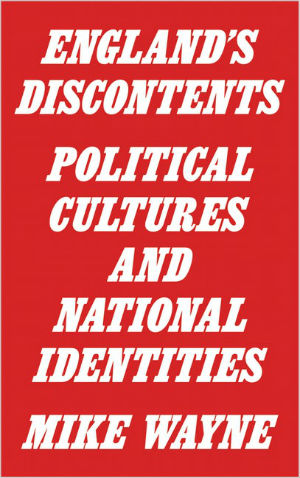
Mike Wayne’s England’s Discontents provides a valuable analysis of how Britain is ruled and the ideology and culture of its elite, argues Chris Bambery

Mike Wayne, England’s Discontents: Political Cultures and National Identities (Pluto 2018), 292pp.
Among my acquaintances is a City financier who commutes into London from his home in leafy Surrey where of a weekend he dons a Barbour jacket and tweeds and goes shooting or to the horse racing, and holds court over dinner. He is playing out the image of a traditional English gentleman. He is of course a full-blooded economic liberal and has to comply with the norms of social liberalism as required by his employers. But he chooses to live in Surrey in part because it is virtually all-white; middle-class white. London rather scares him because it’s not white and he also fears and despises Muslims. That’s all kept under his tweed cap while at work but among friends and family there is no need to be so discreet.
He votes Tory, of course, but he also voted Remain because he sees himself as European. The referendum result came as a shock and he blames it on the white working class who he views as lazy and uneducated. The closest he’s come to visiting Scotland is watching ‘Outlander’, but in 2014 he didn’t want them to vote for independence because it would diminish Great Britain on the world stage, although he doesn’t care that much if those bothersome Jocks buggered off.
I have to confess that this acquaintance doesn’t really exist, but he is an amalgam of City types and Tory politicians I have encountered. In conjuring him up I am trying to address a problem facing the British elite as described by Mike Wayne in his fascinating new book, England’s Discontents: Political Cultures and National Identities.
Drawing heavily on the writings of Antonio Gramsci, Wayne argues that Britain is ruled by a Historic (or Hegemonic) Bloc which emerged with the end of the old Social-Democratic consensus, committed to full employment, the welfare state and reducing poverty, which collapsed in the mid-1970s with the onset of the first great post-war recession.
One key component was classic economic or free-market liberalism which emerged with Margaret Thatcher. That sat, at times uncomfortably, with another component, conservative nationalism. The third component was social liberalism as exemplified by Tony Blair and David Cameron.
Contradictions in the ruling bloc
These three components can clash. Conservative nationalism is at odds with the global economy of which the UK is so much a part. Nationalism and racism sit uneasily with an elite which sees itself as European and global, and while based in London has little loyalty to Britain. Traditional visions of Britain sit uncomfortably with that elite’s vision of UK PLC where Britain is reduced to a theme park where they can play out the role of old-fashioned gentlemen and ladies and where the Royal Family must embrace celebrity culture.
Above all, the base of the Tory Party was deeply affected by the changes wrought by economic liberalism. Their children face an unpredictable future in which professions like the law or medicine are being demeaned by market forces. They disliked Cameron ditching Thatcherite values in favour of social-liberal ones, and given a chance, rebelled when the opportunity came with the EU referendum. Wayne is also clear that a substantial sector of working-class voters took their chance too to take revenge for what the elite had unleashed on them over the past four decades.
The 2008 financial crash brought these tensions out in the open and they have been exacerbated since by the rise in support for Scottish independence and by the Brexit vote.It also relied on the absence of any social-democratic challenge. Thatcher seemed to have clubbed working-class resistance down and down, and Blair to have eradicated any social-democratic electoral presence, though, as Wayne points out, a residual social democracy survived unarticulated within conventional politics except by a few marginalised figures, like Jeremy Corbyn.
Strains and challenges
Yet in Scotland, the SNP was able to articulate that and move to present itself as upholding Old-Labour values. The fact that theme-park Britain was so obviously English alienated many Scots who also saw Westminster as being outmoded. Then came the shock of Corbynism. My imaginary friend hates Corbyn with a vengeance, and that reflects the true feelings of estate agents, bankers, property speculators and so on.
What Wayne does is examine how we are ruled and how hegemony works, the historic bloc’s ability to transmit their ideas down into the lower orders. He also engages with a critique of British society put forward over the years by Perry Anderson and Tom Nairn which sees British capitalism as being historically backward and ruled over by an amalgam of the old aristocracy and the City of London. In my view, Wayne draws the right conclusions regarding that debate and that alone makes his book worth reading. I also think his Gramscian analysis of who rules us today, the culture they espouse and the strains threatening that historic bloc, very valuable.
In his analysis of how Britain was ruled and the ideology and culture of its rulers, Wayne underplays imperialism in my book; one of the reasons why industrial capital shifted from Liberals to the Tories in the last quarter of the nineteenth century was that they saw Gladstone’s support for Home Rule in Ireland undermining Empire. The British capitalist ruling class was also very much a creation of the 24-year-long war against Revolutionary and Napoleonic France.
The other thing missing is the social movements thrown up in opposition to neoliberalism and war. Its conclusion lets down the narrative of his book, but I would urge everyone to read it. It held my interest for every page and left me poring over his arguments.

